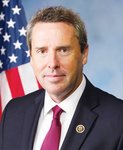

Politicians, especially those running for high office, on both sides of the partisan aisle, love to say they are going to create jobs. In a 2017 piece on economic development, the eponymous host of “Last Week Tonight with John Oliver” showed a montage of six individuals across the political spectrum who talked about jobs using the phrase “jobs, jobs, jobs” in some way.
“Politicians seem to think jobs are like Beetlejuice,” Oliver joked. “If you just say the word a magic number of times, they’ll just pop out of nowhere.”
I wrote in the first edition of this column that I wanted to explore the intersection of business and government fairly regularly. So here I am, doing just that, but on a very broad scale.
I spoke to two elected leaders — U.S. Rep. Mark Walker (R-N.C.) and N.C. Rep. Robert Reives II (D-Chatham) — on this topic because I wanted to hear it from the government people themselves. They had similar perspectives on government’s role in business and the economy, but had different perspectives over whether a current policy position is really making a difference in the long run.
Both Walker and Reives generally agreed that the government should more or less do everything they can to let it do what it’s supposed to do.
“I don’t think they should be controlling it,” Walker told me as we walked from his office to the floor of the U.S. House of Representatives, “but anytime they can create a path, whether it’s small businesses — which is two-thirds of all jobs in this country — or large ones, to have the free rein to be able to expand, to build, that’s what I feel like their role is, not to orchestrate it to the place where they have their finger on the pulse of it.”
Reives, who co-owns the law firm Wilson, Reives & Silverman in Sanford, said that can happen by the government investing things like in education, infrastructure and broadband and making more “macro” decisions.
“Generally, I feel that the government ought to make it easier and better,” Reives said. “I think it’s very important for us to always be thinking forward about economic development, how to recruit businesses, how to help homegrown businesses become successful. Truly, state government decides if businesses are going to live or die in this area. We’re the ones who’ve got make it work in this area. You’ve got to think of putting stuff in place that will allow business to thrive five to 10 years down the road.”
But when it came to both federal and state pushes to lower the corporate tax rate, the two diverged.
At the federal level, the Tax Cuts and Jobs Act passed in December 2017 dropped the corporate tax rate from 35 percent to 21 percent. Walker has touted that bill often and brought it up again while speaking about business and government’s intersection. He said that earlier in the day he spoke to leaders from Pfizer, the drug company which announced last month it was planning to invest $500 million and hire 300 people at its Sanford plant.
“They were saying, ‘We can’t tell you how much that has even impacted Lee County, the Sanford area, by lowering the overall corporate tax,’” Walker said. “They have been able to specifically add jobs right there in Sanford, North Carolina. We’re seeing that manifested right before our eyes. I think that’s what government’s role is, not to pick the winners and losers.”
North Carolina’s corporate tax rate hasn’t dropped as dramatically as it did on the federal level, but has also seen a decrease. The state corporate income tax rate dropped from 3 percent to 2.5 percent at the beginning of this year when new legislation took effect.
While Republican leaders in particular have touted the changes as part of the state’s growing economy, Reives said he believes the change is “reaching the point of diminishing returns.” He said he wants to give “everybody” tax relief, beyond corporations.
“Tax policy is not as simple as, I’m going to cut this tax and it’s going to create this job. It has to be part of an overall economic plan,” he said. “Think of all the other options you have before you increase taxes. The tax policy that we have right now, for me in particular as a business owner, has not made anything significantly better, and I feel like some of the investment in the community and that state that we’ve lost as a result has not made it a better environment.”
I’m not here to provide you an answer to which way is better. Tax policy is a highly-complicated subject that I will probably never be an expert in. But I find the general agreement refreshing — government should do whatever it can to help business thrive — even though how to get there is a matter of disagreement.
Reporter Zachary Horner can be reached at zhorner@chathamnr.com or on Twitter at @ZachHornerCNR, where he will be trying to refrain from complaining about all the streaming services wanting to take his money.